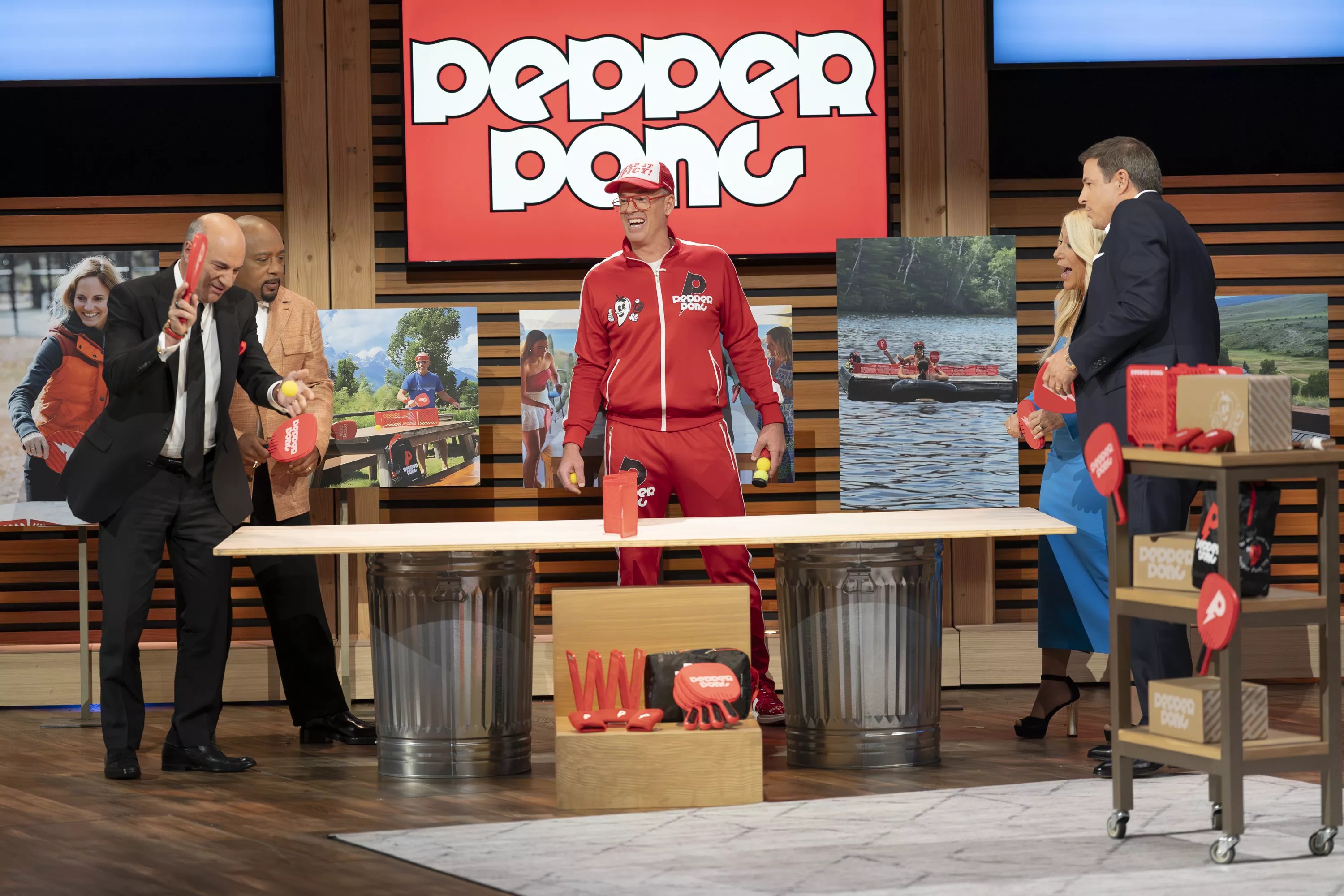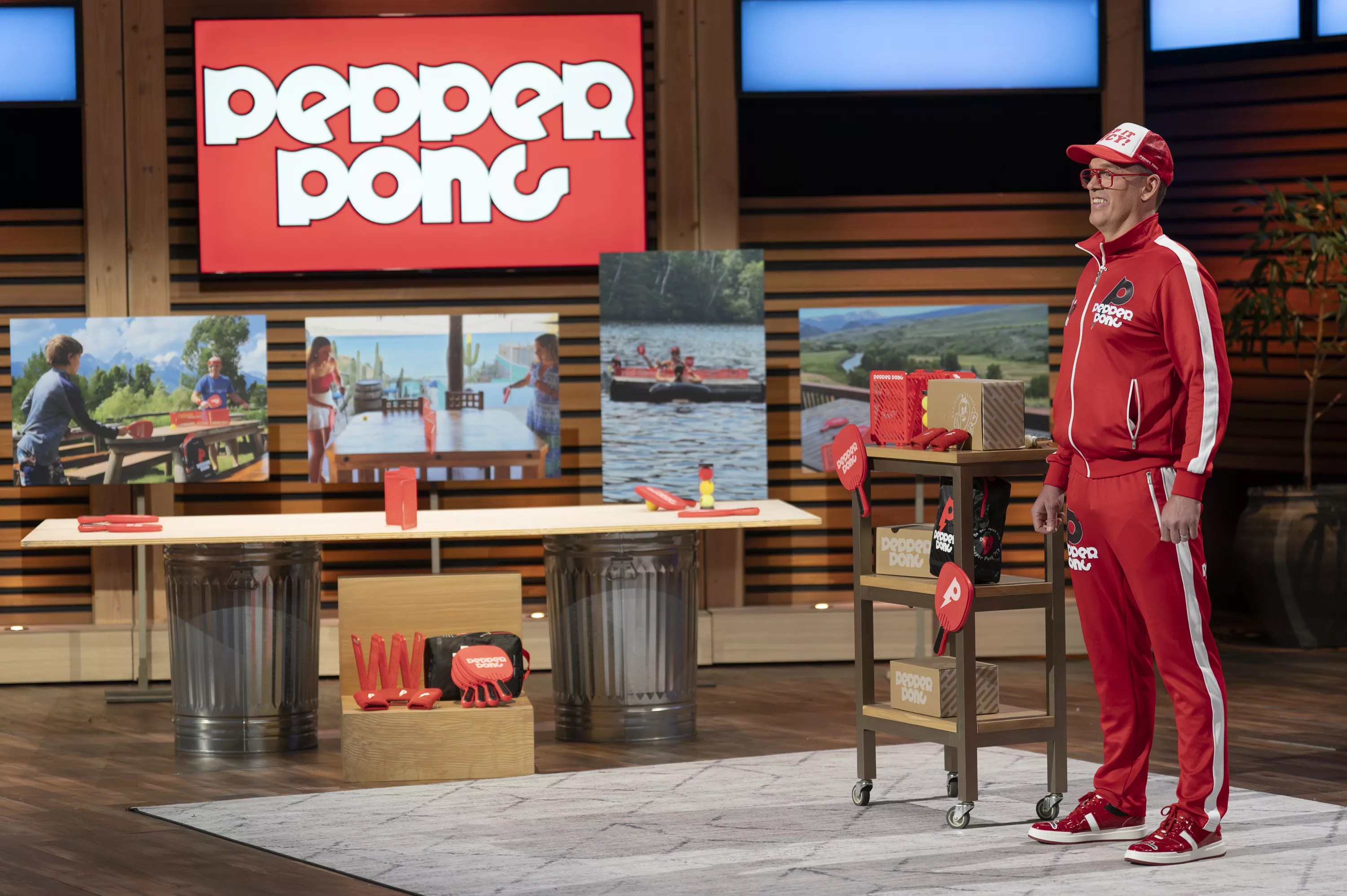
Christopher Willard / ABC Entertainment

Audio By Carbonatix
Sharks, meet Pepper Pong, a Denver invention that could become the pickleball of table tennis, according to Pepper Pong founder Tom Filippini.
The game has been around for a little over a year, but it appeared in front of the world on ABC’s Shark Tank Friday, November 22, when viewers saw Filippini attempt to convince the mega-investors to dole out cash for the ping pong-esque equipment.
He was successful, securing a $150,000 investment from Todd Graves, guest shark and CEO of Raising Cane’s. Filippini negotiated Graves down from his originally proposed 25 percent stake to 19 percent, marking a fun victory for the local brand.
Pepper Pong is a fully portable game with a net that stands independently as well as four paddles and three balls of different densities. The result is a game many will recognize as ping-pong, but Filippini says the game is easier to pick up, quieter and way less cumbersome than a traditional ping-pong setup.
“Much like pickleball has leveled the playing field in the larger racket sports realm, vis-Á -vis tennis and other racquet sports, Pepper Pong really levels the playing field vis-Á -vis ping-pong, such that it’s really fun no matter if you’re a first-time player, or you’ve been playing for a long time,” Filippini says. “It’s a blast, whether you’re a great ping-pong player or a terrible ping-pong player.”
Filippini is no ping-pong scrub, having grown up in Chicago playing the game with his four siblings in the basement during the long winters. He moved to Colorado after college in Pennsylvania, but his passion for paddle sports never left. A career entrepreneur and business founder, he always wanted to create something that connects people over a fun activity.
Pepper Pong has been bouncing around in Filippini’s head since the early 2000s. While in rehab in 2016 for an alcohol addiction, he began to lock down the idea. He was also playing hours of ping-pong.
“It was during that time that I really needed something to grab on to that could be a distraction from the battle that I was fighting,” Filippini says. “But over the years, I became fairly disenchanted with ping-pong, although I love it as a sport. It’s too unreliable in many cases. The gear is very fragile and tends to be broken easily. The table is, obviously, massive, and you’ve got to have a place to store it.”
As he turned those thoughts over in rehab, Filippini realized his biggest problem with ping-pong is its difficulty, leading to blowout matches and boredom from participants and observers alike. Pepper Pong has more durable equipment and the ball doesn’t fly quite as fast, so it’s way easier to pick up and roll with, solving Filippini’s problems with his childhood sport.
Pepper Pong’s rules are basically the same as those of ping-pong, but with some fun twists: The oldest player always serves first, and the trailing team in a game-point scenario always gets to serve. And if you’re playing best of three or five and find yourself facing elimination, Pepper Pong provides a point handicap for that, too.

Tom Filippini is a longtime Denver entrepreneur.
Christopher Willard / ABC Entertainment
Filippini promises the game remains fun for even advanced players like himself, as it becomes more strategic. Additionally, playing on imperfect surfaces like the top of a cooler or the hood of a car adds unusual elements to the game that would never emerge in ping-pong.
He often tries to connect the dots from the meteoric rise of pickleball to his Pepper Pong strategy, and thinks both are attractive to broad swaths of people because they use balls that allow airflow compared to their traditional counterparts in tennis and ping-pong.
“The heart of what makes it easier to play is that you’re playing with a soft, porous ball that doesn’t move nearly as fast, so you have more time to hit it,” Filippini says. The Pepper Pong paddles are also cushioned, eliminating the noise problem that has plagued pickleball – and people who live by the courts.
The team aspect of Pepper Pong is also important to Filippini, who has seen how effective active table games are at bringing people together. In the heart of pandemic restrictions in 2021, he and his family had grown weary of playing endless ping-pong games against each other in their game room, so Filippini created “Pong Island” by setting up a table on the 400 block of Williams Street where he lives and inviting anyone to sign up through a QR code and use the equipment. Before Denver Parks & Recreation shut Pong Island down, Filippini says, people were playing ping-pong at all hours of the day.
He named the game Pepper Pong because he loves hot sauce and spicy foods. There are three types of balls in the game, called “peppers,” that correspond to the Scoville scale of hot peppers: the jalapeño, the habanero and the ghost pepper.
The spice level corresponds to the ball’s bounciness and pace, so the jalapeño is the least bouncy and the ghost pepper is the most bouncy. The jalapeño is ideal for small surfaces and precision players, according to Filippini, while the habanero is the “go-to” for the majority of playing, and the red ghost pepper ball is the most dense of the three and bounces very high. A perk of the ghost pepper compared to a ping-pong ball: The ghost pepper can be used in “almost gale-force winds” for outdoor play, Filippini says.
The ability to play the game on any surface, anywhere is key to Pepper Pong; Filippini doesn’t want people to feel limited and miss out on connections because they couldn’t find a place to play.
“What really irks me is people sitting around on their phones and not connecting, especially like during parties or a holiday,” Filippini says. “I sort of wanted to create the equivalent of the deck of cards, but in an active type of a format.”
Even Grandma can jump into a game of Pepper Pong, he suggests. But what about the investors on Shark Tank?
Filippini can’t share much before the episode airs, but he’s confident in the product. According to him, Pepper Pong was contacted by a recruiter for the show who asked the company to apply. Filippini had always thought Shark Tank was too competitive to be worth trying out for, but the recruiter’s message made him go for it.
“It was definitely a rigorous, rigorous process,” Filippini says. “I found the actual filming of it to be just a weird experience. A really positive experience, and one that I learned a lot from, but I’m not going to pursue an acting career, let’s put it that way.”
Filippini says he didn’t realize how much time he would spend in the Sony studio preparing to film, and he’s curious to learn how the many hours spent shooting will be condensed into ten or fifteen minutes of an episode segment.
“It’s a surreal experience to have filmed it, and I vaguely remember what transpired up there, so I’ll be almost as curious as anyone else, sort of watching it like a third party, even though I was the person filming,” he says. “I do remember some very intriguing and suspenseful components that I think people will get some serious entertainment value from watching. … It gets extraordinarily spicy up there.”
This article was updated to reflect the outcome of the November 22 episode of Shark Tank.